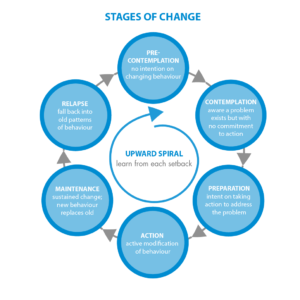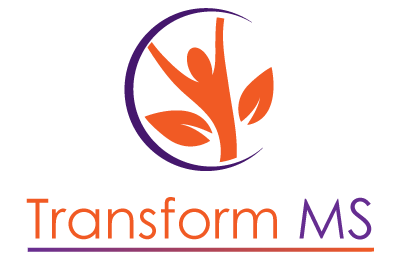Creating Lasting Change: Transforming Life with Multiple Sclerosis
One of my mentors always told me that your current state is a summary of our past and a prediction for the future. In other words, if you do what you’ve always done, you’ll get what you’ve always got. And in the face of a diagnosis of multiple sclerosis, that’s not necessarily what we want. Understanding that change is necessary, not from a punitive perspective, but with the optimism that all the good, new science provides, is key to transforming life with MS and living beyond the diagnosis.
Over the years, I have noticed three key concepts that differentiate people in their ability to follow through on their resolve to make things better. Let’s explore these concepts and how they can be applied effectively to create lasting change in your life.
1. Make Your Commitment Real
Strategy: SMART Goals
- Specific: Clearly define what you want to achieve – journal it, hold it firmly in your mind and in your heart.
- Measurable: Track your progress – some of the markers I use with my patients include energy levels, quality of sleep, activity…amongst others
- Achievable: Set realistic goals, so you can celebrate the wins!
- Relevant: Ensure the goal is meaningful to you – not what someone else is doing.
- Timely: Establish a regular practice and schedule to keep you on track and guide your progress.
Any change requires new patterns, and new patterns require more than a couple of weeks to embed. The first few weeks may include a lot of positive self-talk or visualization just to keep you on track. Post your affirmations around the house, set up safety nets to catch you if you waver, and if you do “fall off the wagon,” don’t throw your arms up in surrender. Stop, breathe, and resume. All is not lost in one moment of “weakness.” Remember your commitment to change and be firm but forgiving with yourself.
Implementation Tools:
- Affirmations and Visualization: Use daily affirmations and visualize the positive outcomes of your change. Place visual reminders in your environment.
- Safety Nets: Create backup plans and support systems to help you stay on track. This can include having an accountability partner or a coach.
- Self-Compassion: Recognize that setbacks are part of the process. Treat yourself with kindness and avoid self-criticism.
2. Believe in Yourself and Your Mission
Strategy: Confidence Building
- Build Confidence: Reflect on past successes and remind yourself of your capabilities.
- Positive Reinforcement: Celebrate small milestones.
- Growth Mindset: Adopt the BELEIF that you will grow and improve with persistence and perseverance.
Science has backed what Naturopathic Doctors have held as true for decades (or longer): your success in transforming life with MS depends so much on how you see yourself and whether you truly BELIEVE in what you’re doing. This is a good place for more visualization and positive affirmations.
Implementation Tools:
- Visualization: Regularly visualize yourself in your desired state and the positive impact it will have on your life.
- Affirmations: Reinforce your belief with statements like “I am capable of making this change” and “I believe in my ability to achieve this change.”
- Surround Yourself with Positivity: Hang out with people who support your goals and avoid those who bring negativity.
3. Understand the Cycle of Change
 Creating lasting change is not always easy, and understanding the “cycle of change” is crucial. You can step in and out of it at any stage as many times as you need before your desired change becomes a reality.
Creating lasting change is not always easy, and understanding the “cycle of change” is crucial. You can step in and out of it at any stage as many times as you need before your desired change becomes a reality.
The cycle of change has six stages:
- Pre-contemplation: At this point, you have no intention of changing your behavior. Others may realize that a little change may actually serve you, but you don’t.
2. Contemplation: Here, you may realize there is a problem but feel stuck, wishing there were something you could do but not knowing how to start.
3. Preparation: This is where you are committed to action; you’re just waiting for the stars to align before you start.
4. Action: You do it! You modify your behavior and your surroundings to support the change you’ve been preparing for.
5. Maintenance: Acquiring new skills, avoiding temptation, and maintaining the new behavior that has fully replaced the old one.
6. Termination or Setback: Termination (of the cycle of change) happens when the new behavior is so entrenched that you don’t even think about it—a transformation if you will. A setback is a normal part of the process where you might fall off the wagon. At which point you pick yourself up, dust yourself off, and get right back on that wagon and enter the cycle wherever it was you fell out. No shame, no blame, no judgment. Most people go through the cycle at least twice before a change becomes a new habit..
Implementation Tools:
- Keep Track of Your Progress: Use a journal to log your progress through the stages. Note any challenges and how you overcome them.
- Educate Yourself: Understand that setbacks are normal and part of the learning process. Use it as a stepping stone rather than a stumbling block.
- Seek Support: Engage with a community or support group that shares similar goals. This can provide motivation and accountability.
Embracing Change for a Healthier Future
Learning to live beyond the diagnosis of multiple sclerosis and truly transforming life with MS means understanding that creating change in what we do and how we think is necessary – once again not from a punitive perspective, but with the optimism of all the good, new science that is available to us now. First and foremost, this relates to lifestyle because our modern lifestyles do not promote good health on any level. So, embracing lifestyle change to create a healing life will allow you to transform.
Health and Lifestyle Evidence Already Exists for MS and Continues to Grow!:
- Exercise: Regular physical activity has been shown to improve mobility, muscle strength, and overall well-being in people with multiple sclerosis. It can also reduce fatigue and improve mood – it even plays a huge role in remyelination
- Diet and Nutrition: A healing diet rich in fruits, vegetables, lean proteins, and healthy fats can reduce inflammation and support overall health. Specific diets, like the Mediterranean diet, have shown promise in managing multiple sclerosis symptoms.
- Stress Reduction: Mindfulness, meditation, and other stress-reducing techniques can significantly improve mental health and reduce the frequency of multiple sclerosis flare-ups.
Your health requires change, not for any punitive reason, but so that we can move forward and do the best things possible to support our health now and in the future. What we have seen in the evidence base is that beginning or maintaining your journey with healthy lifestyle change is absolutely connected to positive results in multiple sclerosis.
Final Thoughts
Creating lasting change in your life, especially while managing a diagnosis of multiple sclerosis, involves commitment, belief, and understanding the cycle of change. Embrace the process of change with optimism, knowing that you have the power to shape your future. Develop the skills to master change, and these will serve you throughout your journey, transforming your life with multiple sclerosis. Remember, the journey to self-improvement is ongoing, and each step you take brings you closer to your goals. Be patient with yourself, celebrate your progress, and know that you are capable of making lasting changes that will positively impact your health and well-being. You have the power to create a healthier, more fulfilling future.
For more personalized advice and support on managing MS, consider joining me in private practice or joining one of my workshops or programs – sign up for the mailing list to keep connected!
Schedule a discovery call with Dr. Teri Jaklin ND, IFMCL here.
Building your health care team and connecting with a community of like-minded individuals is so important on your journey to better health.
References:
- Smith, J. (2020). The Power of Positive Thinking. Publisher.
- Jones, A. (2019). The Science of Behavior Change. Journal of Health Psychology, 10(2), 123-135.
- National Multiple Sclerosis Society. (n.d.). Understanding Multiple Sclerosis. Retrieved from https://www.nationalmssociety.org/What-is-MS
- Harvard Health Publishing. (2022). Diet and Multiple Sclerosis. Retrieved from https://www.health.harvard.edu/diseases-and-conditions/diet-and-multiple-sclerosis


May I ask if you Teri would teach/mentor me plz.
Hi Theresa, I am just finding this comment now believe it or not. I didn’t realize that they went to my web host. It may be rather silly responding at this point, but I feel like I know you, Theresa! If this is something that you are still interested in, please pop me an email at drterijaklinnd@terijaklin.com and we will talk about it some more.
Take gentle care
Teri